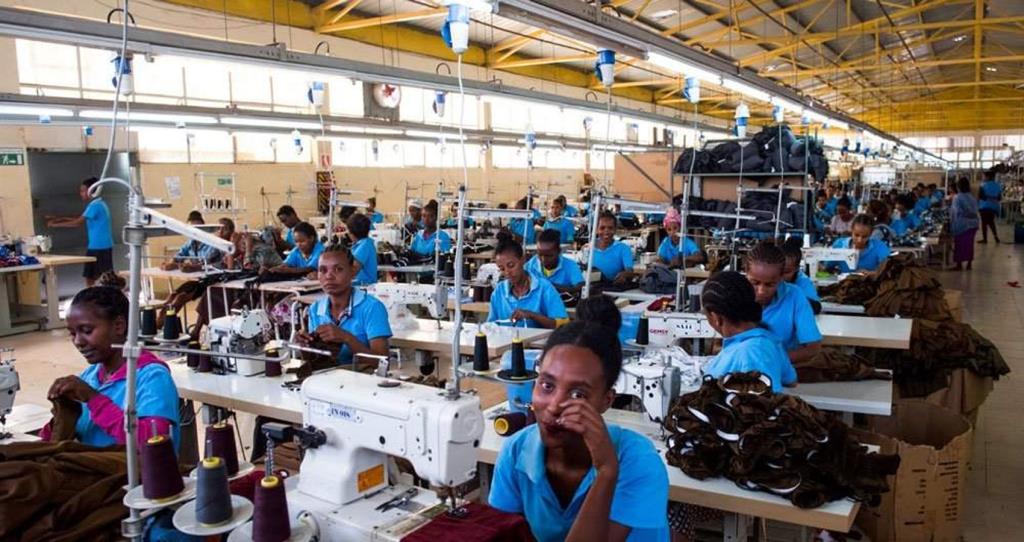Showbiz
Technology’s Impact on Fashion Manufacturing Industry

The fashion industry is a very competitive one. There is always someone new designing clothing with a new look. Keeping a collection on the cutting edge and selling to customers is a problem. How can a fashion company track what products are selling well and which ones should be discontinued and replaced with better-selling items? Technology is the way to keep a company running smoothly and on the leading edge of fashion sales.
How Is Technology Used In Fashion Manufacturing?
The clothing manufacturers use technology such as a product lifecycle management system in clothing design, sourcing of materials, collaboration, and supply chain management. The technology available online can help manage stocking and manufacturing processes and tell a company where their product is being marketed and sold and how successful each location is. They can find out what population demographic is buying their fashion products. Companies can also manage their bookkeeping and finances with the software.
The footwear, accessory and clothing industries are dealing with complicated and ever-changing global markets. Customers are demanding smart, up-to-date, personalized, and sustainable products at competitive prices. Companies must also keep track of their competitors. Fashion trends change often, and what is selling well one month may not sell at all in a few months.
The advantages of using technology in the form of product lifestyle management programs include:
- Product lifecycle collaboration with everyone in the design, production, and sale of the products. A single source of information for material supplies, size and measurement charts, designs, colour palettes, and other information brings unity to a company.
- Reducing the need for the physical sampling of every material used in the fashion design and manufacturing process. Virtual collaboration and viewing of samples will save time and reduce mistakes.
- Using this software can make it possible to shorten the time from initial design to getting fashions to the market and customers.
- Centralization of a fashion manufacturer’s operations is easier. When one set of cloud-based software is used by all parts of a company’s manufacturing process, a company can run more effectively with all the parts having an easier time communicating.
The Impact of New Technology on Fashion
All areas of the fashion industry have been improved or affected by technology. Product production has been made easier, faster, and smoother. The new production methods using technology benefits customers as well as manufacturers. It helps with reducing manufacturing waste and costs.
With modern technology, clothing and fashion brands can increase their reach or influence and reach more markets than in the past. They can use websites and social media to get the word out faster and further when a new collection is being introduced.
Technology helps fashion companies research the market and find the materials to use in a new collection faster. Then, they can find out what their potential customers prefer and what trends are strong and which ones are ending.
Fashion manufacturers and retailers can have websites that let customers see new outfits and what they might look like on them using avatars on site. The software on websites can help customers customize their fashion choices from home. This is an advantage when many customers are shopping more from home because of the pandemic and other reasons.
Fashion retailers and manufacturers who embrace the new technology can keep up with today’s customers and grow their businesses.
Showbiz
No One Is Safe: Six New Singles Storm the Love Pad In the Heartbeat Show

Episode 4 of Heartbeat kicked off with the drama still simmering from the last episode. Latifah held all the cards, literally, and shocked everyone by choosing Ken to spend the night in the Love Nest, going back to familiar ground instead of exploring someone new. a move that instantly set the tone for the night.
The Love Dip Game followed, flipping the house upside down once again. Matching numbers meant new overnight partners, leading to unexpected pairings: Igwe with Shekinah, Kena with Toria, Alvin with Chidera, and Hilda with Henri.
The biggest shock of the night was Kena and Chidera getting separated despite being emotionally“locked in”y. Kena assured everyone it wouldn’t affect their bond, but later that night, after tucking Chidera into bed, he was spotted hopping onto Hilda’s bed, leaving the house buzzing. Some singles quietly opted to sleep alone, choosing peace of mind over drama.
Morning brought no relief. Some woke up smiling, but others were drowning in emotions. Toria broke down, exhausted and overwhelmed, while Chidera offered comfort. Kena and Shekinah questioned how couples already “locked in” could even be split. Ken appeared unsure of what he wanted, Igwe was back to his charming ways with Shekinah, and Toria watched every move, convinced their connection wasn’t real. Meanwhile, Ken and Latifah kept the chemistry alive in the Love Nest, and Igwe eventually tried to make peace with Toria, only to sneak in some playful taunting afterwards.
Just when things felt tense enough, the energy in the Love Pad shifted, new singles arrived, and sparks immediately began to fly.
Meet the new singles.
Jane: She is an artist and businesswoman, confident and ambitious. She’s here to make her mark, stand out, and see which connections ignite the most chemistry.
Bosah: Describes himself as cool, calm, collected, and a man of many layers. He avoids manipulative women and hopes to impress through thoughtful conversation and genuine interactions. His type? Light-skinned women who can communicate.
Timi: Describeshimself as the cool guy, mysterious about his love life; he is here to find love while testing others. Tall, dark-skinned, slim women with pretty faces are his type, while insensitivity is a dealbreaker. He plans to vibe naturally and let connections flow.
Sharon Ray: The fashionista, fun, funny, and sarcastic one. Cheaters are a no-go for her, and she plans to make her impression by being unapologetically herself. Her ideal match? Tall, clean men.
Victory: He brings calm, mature energy. Petite, kind, gentle women who can hold constructive conversations catch his eye, while self-centred ladies are a no-go. He’s all about exploring chemistry quietly and naturally.
Ceeoni: Described herself as an icebreaker, witty, fun, and energetic. She loves intelligent, refined men, can’t stand “dirty” behaviour, and is ready to warm her way into someone’s heart while keeping things playful.
The new singles wasted no time in turning heads. Latifah joked that Victory feels like “Ken Pro Max”, and she has an eye for him. Victory admitted interest in Shekinah, Latifah, and Toria, and Toria already sensed Ceeoni might stir up trouble.
To keep things spicy, the singles played a daring card game where each picked a challenge and had to follow it, and things got wild fast. Latifah mimicked the person she finds most annoying (Henri), Toria called out Igwe and Shekinah’s “fake” connection, Shekinah kissed Igwe, Bosa kissed Latifah, Kena seductively fed Chidera, and Ceeoni boldly sat on Ken’s lap, whispering in his ear. Jealousy, tension, and unexpected sparks flew everywhere.
As the night wound down, Latifah and Ken tried to navigate the sudden surge of attention from both old and new singles. Meanwhile, one of the newcomers, Jane, openly declared that she wants Kena, no matter who he’s paired with or locked in with.
By the end of Episode 4, old bonds were shaky, new attractions were forming, and the Love Pad felt more crowded and complicated than ever. With fresh faces, high emotions, and hearts in motion, anything can happen next. Who will find real connection, who will flirt their way into trouble, and who will get left behind?
Tune in to Episode 5 to find out.
Catch Heartbeat every Sunday at 9 pm on Africa Magic Showcase, GOtv Channel 8.
Subscribers can also enjoy all these and even more value with the We Got You offer, available until 28th February 2026. When you pay for your current package, you’re automatically upgraded to the next package at no extra cost, giving you access to more channels, more shows, and even more ways to unwind.
To upgrade, subscribe, or reconnect, download the MyGOtv App or dial *288#. For catch-up and on-the-go viewing, stream anytime on the GOtv Stream App.
Showbiz
Top 5 Movies We Would Like to See Nominated for 12th AMVCA

The African film industry is buzzing with anticipation for the 12th edition of the Africa Magic Viewers’ Choice Awards (AMVCA). Widely regarded as the “African Oscars,” the AMVCA isn’t just an awards ceremony; it’s a high-octane celebration of our stories, our fashion, and the sheer technical brilliance of filmmakers around the continent.
With the call to entry now officially open, all eyes are on the films that defined 2025 and could dominate the ceremony in May 2026. This year also marks an exciting shift with the introduction of new categories, such as Best Indigenous Language – North Africa and Central Africa, signalling a more inclusive era for continental storytelling.
We saw a series of blockbuster releases and record-breaking titles that captured audiences and sparked conversations across the continent. While the jury ultimately decides the nominees, the streets are already talking. Based on the incredible run of films released between January and December 2025, here are a few movies we would like to see dominate the nominations:
To Kill a Monkey
If any Nigerian film broke the internet in 2025, it was To Kill a Monkey. Kemi Adetiba proves once again why she’s at the top of her game, delivering a bold and culturally resonant story full of ambition, moral conflict, and unforgettable moments. Anchored by a powerful performance from William Benson, the film explores ambition, desperation, and compromise in a way that feels deeply relatable to the Nigerian experience. With exceptional production value, a memorable soundtrack, and storytelling that sticks with you long after the credits roll, To Kill a Monkey is a film made for AMVCA recognition across major categories.
3 Cold Dishes
The AMVCAs have always stood for celebrating the very best of African storytelling, and 3 Cold Dishes fits squarely into that tradition. It is a bold, well-told story that centres African women, African realities, and the kind of cross-border narratives that reflect the continent’s shared experiences.
Led by a standout performance from Osas Ighodaro, the film flips familiar narratives by placing women at the heart of a revenge story shaped by trauma, survival, and justice. Directed by Asurf Oluseyi and executively produced by Burna Boy, the film moves across multiple African countries, using its scale to spotlight the realities of human trafficking without losing emotional depth. Its strong storytelling, cultural relevance, and ambition make 3 Cold Dishes one of the most notable African films of late 2025 and a deserving AMVCA contender.
Mother of the Brides
Africa Magic delivers another hit with Mother of the Brides, a Lagos family drama full of heart, humour, and tension. When their father dies without a will, a matriarch has just 45 days to marry off one of her four daughters or risk losing everything to tradition and scheming in-laws. Her mother works tirelessly to keep the family together amid pressure from relatives and society.
The film doesn’t just show weddings and family drama; it also highlights the darker side of titled families in Nigeria, exposing secrets, power struggles, and the lengths people will go to protect their interests. With strong performances from Gloria Anozie-Young, Kalu Ikeagwu, Linda Ejiofor, Uche Chika Elumelu, and Ibrahim Suleiman, Mother of the Brides delivers laughs, tension, and storytelling, making it a clear standout for AMVCA attention.
Baby Farm
Mo Abudu and EbonyLife hit another high note with Baby Farm, a gripping drama series that shines a light on the dark world of “baby factories.” Starring Rita Dominic and Onyinye Odokoro, the film follows a young woman lured into a prestigious Lagos NGO only to uncover a sinister trafficking ring. Heavy, intense, and impeccably executed, Baby Farm combines blockbuster production quality with socially relevant storytelling, the kind of film that has the power to dominate the AMVCA nominations.
My Father’s Shadow
A cinematic landmark, My Father’s Shadow is the first Nigerian film to grace the Cannes Official Selection. Directed by Akinola Davies Jr., the story follows two young brothers reconnecting with their elusive father against the backdrop of 1993 Lagos. With a powerhouse performance from Sope Dirisu, the film is a poetic exploration of family, memory, and a nation on the brink of change. Its visual storytelling, direction, and performances make it a strong contender for technical and acting awards.
From bold, socially conscious blockbusters to intimate, character-driven stories, 2025 was a remarkable year for African cinema. Each of these films shows the range, depth, and ambition of filmmakers across the continent, telling stories that are both locally grounded and globally resonant. As the 12th edition of the AMVCA approaches, we hope these standout titles get submitted and have the chance to be recognised for the impact, creativity, and storytelling they brought to the screen.
Showbiz
Your After‑Work Escape: GOtv Shows You Can’t Miss

After a long day of work, traffic, deadlines, and back-to-back responsibilities, the last thing most people want is more stress. They just want something that helps them relax. Something familiar that helps their mind slow down. For many households, that small moment of calm begins with the TV.
It is the background comfort while dinner is being made, the show you ease into from the couch, or the story that gently pulls you away from the stress of the day. And with GOtv’s mix of drama, family favourites, and everyday storytelling, finding something to match your evening mood is easier than ever.
Whether you want light entertainment or an engaging drama to sink into, these shows make the perfect after-work escape.
Sister Sister – 6:30 PM | ROK 2
Sister Sister follows the intertwined lives of identical twins Nelly and Nora, two women born of the same blood but shaped by very different experiences. As they navigate Lagos, love, ambition and family expectations, the sisters find that even the closest bonds can be pushed to the brink when secrets, choices, and personal dreams collide.
This isn’t just another family drama. It is a story about identity, loyalty, and the unspoken ties that bind us. With every episode, you’ll find yourself drawn deeper into their world, laughing, feeling their losses, and wondering how far the family can stretch before it breaks.
Battleground – 5:00 PM | Africa Magic Family
At the heart of Battleground is Chief Kolade Badmus, a man of influence whose drive for success leaves his family entangled in rivalry, secrets and betrayal.
Kolade’s elegant but sharp‑witted wife, Adaora, tries to hold the family together while his second wife, Cissy, navigates her own place in the home. Their children, from Mayowa to Teni and Ayo, each carry ambitions and wounds that fuel personal battles and fierce emotional stakes.
Battleground tells a powerful story where loyalty is tested, love is complicated, and every family dinner could uncover another buried truth. With strong performances from veterans like Joke Silva and Shaffy Bello and a narrative that feels as intense as real life, this series is the kind of drama that makes you want to close work early and beat the traffic just so you don’t miss it.
Gifted – 8:00 PM | ROK 2
When young Ebele’s parents die suddenly, she’s thrust into a world of hardship, living under the care of an uncaring uncle and his cruel wife. But in the midst of grief and struggle, something extraordinary begins to stir within her.
Gifted is the story of the transformation of a girl who discovers a remarkable ability that challenges everything she thought she knew about herself. As Ebele’s gift begins to unfold, so does a journey of self‑discovery, resilience and unexpected purpose.
This is not a heavy drama. It is emotional, inspiring, and deeply human. Gifted offers a narrative that reassures, uplifts and reminds you that strength often arrives from the most unlikely places.
The Split – 8:30 PM (Thursdays & Fridays) | Africa Magic Showcase
In a busy banking world, three ordinary professionals, Abdul, Harriet and Tola, face pressure that few of us can imagine. A dormant bank account surfaces, tempting them with the promise of the life they’ve always wanted. But what starts as a risky opportunity slowly evolves into moral conflict, betrayal, and decisions that blur the lines between right and wrong.
The strength of The Split lies in its characters, people you quickly grow to care about, fear for, and judge with every choice they make. It’s a slow-burning drama that pulls you in and keeps you daydreaming, counting the days and hours until the next episode.
These shows are more than just TV content, they are stories with heart, tension, depth and character that make your evenings feel richer. Whether you want laughter and empathy, deep family drama, emotional transformation, or edge‑of‑your‑seat twists, there’s a perfect unwind waiting for you.
Right now, subscribers can enjoy all these and even more value with the We Got You offer, available until 28th February 2026. When you pay for your current package, you’re automatically upgraded to the next package at no extra cost, giving you access to more channels, more shows, and even more ways to unwind.
To subscribe, upgrade, or reconnect, download the MyGOtv App or dial *288#. You can also stream your favourites anytime with the GOtv Stream App.
-

 Feature/OPED6 years ago
Feature/OPED6 years agoDavos was Different this year
-
Travel/Tourism9 years ago
Lagos Seals Western Lodge Hotel In Ikorodu
-

 Showbiz3 years ago
Showbiz3 years agoEstranged Lover Releases Videos of Empress Njamah Bathing
-

 Banking8 years ago
Banking8 years agoSort Codes of GTBank Branches in Nigeria
-

 Economy3 years ago
Economy3 years agoSubsidy Removal: CNG at N130 Per Litre Cheaper Than Petrol—IPMAN
-

 Banking3 years ago
Banking3 years agoSort Codes of UBA Branches in Nigeria
-

 Banking3 years ago
Banking3 years agoFirst Bank Announces Planned Downtime
-

 Sports3 years ago
Sports3 years agoHighest Paid Nigerian Footballer – How Much Do Nigerian Footballers Earn











